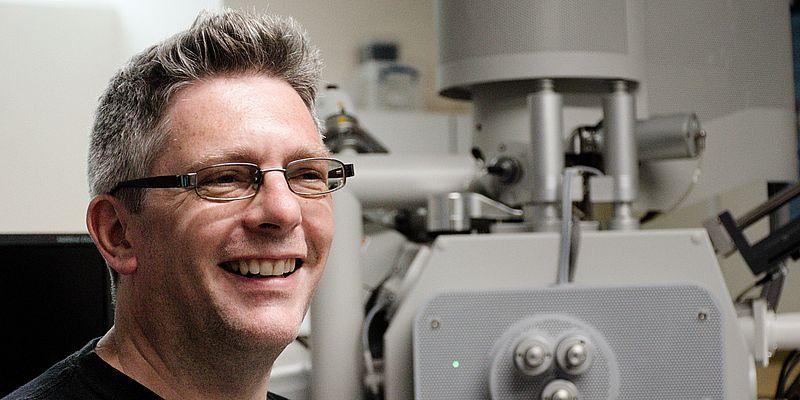
Submitted by Administrator on Wed, 10/07/2019 - 10:04
Richard Harrison (Fitzwilliam 1990), Professor of Earth and Planetary Materials and Fellow of St Catharine’s College, will take over as Head of Department on 1st August 2019.
Richard was both an undergraduate and graduate student in the Department. After spending nearly five years as a post-doctoral researcher at the Institut für Mineralogie in Münster, Germany, Richard returned to the Department as a research fellow in 2001 and became a lecturer in 2006. Richard’s current research uses state-of-the-art experimental techniques to study the fundamental properties of magnetic minerals at the nanometre scale, including extracting meaningful paleomagnetic information from meteorites.
“It’s an honour to be taking on the role of Head of the Department of Earth Sciences, a place that has been my scientific home on and off for the last 29 years,” said Richard. “I’m looking forward to working with our fantastic staff, post docs, graduate and undergraduate students to enhance our world-leading research and teaching programmes in the Earth, environmental and planetary sciences.”
Simon Redfern (Gonville and Caius 1982) steps down as Head of Department at the end of this academic year. Simon, currently Professor of Mineral Physics and a Fellow of Jesus College, has been appointed the new Dean of the College of Science at Nanyang Technological University, Singapore (NTU). Simon was the founding Chair of the NERC Cambridge Earth Science DTP, a member of the Committee on Radioactive Waste Management and has previously served as a British Science Association Science Media Fellow at the BBC. Simon recently secured funding for a new centre at the University of Cambridge that will develop AI techniques to help address some of the biggest threats facing the planet.
“Cambridge Earth Sciences has been my intellectual home since I first arrived here from Devon in 1982 - I have spent more than thirty years in the Department, man and boy,” said Simon. “I will be taking early retirement from my University position, but the Department and Cambridge will, I know, remain close to my heart as I move even further east.”
“NTU in Singapore has seen a meteoric rise in its science and engineering impact over the last decade or so, shooting up the international league tables of universities. I will be moving from, arguably, the best “ancient” university in the world to one that has consistently ranked as the best young university in the world. NTU has close connections with Cambridge already in the areas of green technology research and energy research, and is a world leader in AI. The Earth Observatory of Singapore and the Asian School of the Environment at NTU have developed new courses and areas of research that place them at the forefront of aspects of the subject, from their foundation only ten years ago. From my recent visits I have been immensely impressed by the enthusiasm and vigour of my future colleagues, and of the research landscape in Singapore. I am looking forward to the opportunities and challenges of helping shape science, including biology, chemistry, maths and physics as well as Earth and environmental science, at NTU in the coming years.”
